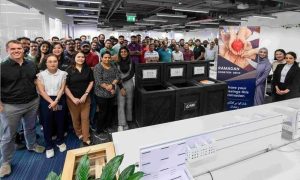“Rising fuel costs will encourage regional uptake of biofuel”
Truck & Fleet ME Speaks to Yusif Saeed Lootah of UAE-based Lootah biofuels

Use of biofuels by the global vehicle fleet is expected to reach 8% by 2022, and climate and costs will hasten uptake in the Middle East, says Yousif Saeed Lootah, CEO of Lootah Biofuels
What is the present capacity of your plant in Dubai?
Our pilot project for biodiesel production has capacity for 300,000 litres of B100 (100% biodiesel) in a month. In the first stage, we are providing B5, which is a blend of 95% of petro diesel and 5% of biodiesel B100. We cater to logistic and transport companies and school buses in Dubai. The Dubai Road and Transport Authority has joined hands with us to become a part of our green initiative.
What are some of the advantages for using biofuels in the Middle East compared to other markets likes the US or Europe?
Biofuels have a better future in Middle East compared to the US and Europe. In northern US, Europe and other cold regions of the world, a major concerns among the users is the fuel’s unfavourable cold flow properties. In cold climates, it can be a challenge to fuel vehicles with high blends of biodiesel because it tends to freeze at higher temperatures while conventional diesel doesn’t. In the Middle East, however, temperature are relatively high which best suits the use of biodiesel. According to the standards set up by the Worldwide Fuel Charter Committee, EN 590 and ASTM D975 fuel specifications for petroleum-based automotive diesel fuel permit a biofuel extender content of up to 5% (B5) of the blend. This is up to 20% in the US because it represents a good balance of cost, emissions and cold-weather performance and does not require engine modifications. Much like traditional, pure diesel, these blends can be used in any application. Engine manufacturers recommend B5 blending as it calls for no modification in the engine or fuel system. This is a great opportunity for governments to encourage mandatory B5 blending, given its long-term advantages.
How has your business of extracting biofuel from used cooking oil progressed in the past four years?
We have managed to build up a systematic mechanism to collect used cooking oil from the restaurants, bakeries and food processing units throughout the UAE. We have a dedicated team for used cooking oil collection. Presently we are collecting waste oil from more than 250 outlets and we are expecting that this number will go up. In cities like Dubai and Abu Dhabi, there are more than 4000 restaurants having a great potential to deliver used cooking oil for biodiesel production. The challenge is to get it consolidated and converted into biodiesel and get it dispensed through the dispensing channel. This requires great synergy between various stakeholders such as waste management companies, biodiesel producers and fuel companies as well as support and incentives from the government.
Another challenge is to make people and restaurants aware of the hazardous consequences of using used cooking oil intermittently because of the high acid content which can cause several diseases. We do a 100% conversion of the waste oil into biodiesel by the process of recycling, thereby converting waste into energy. Our awareness campaigns to promote a green environment has subsequently shown positive results which is evident from an increasing number of food chains that provide us used cooking oil and are partners in our sustainability drive.
According to estimates, biofuels will make up 8% of the world’s oil volumes by 2022. Do you think the GCC will have an important share in this?
I am quite certain that the GCC will have an important share in the demand and market of biofuels by 2022. Among the Gulf countries, the UAE is the pioneer in biofuels production. Lootah Biofuels has plans for expansion in the entire GCC, Europe and US. Our initiatives have raised the demand for biofuels in the region as we see a clear rise in the number of organisations and people who join hands with us in our sustainability drive. This clearly proves that by 2022, the GCC will definitely have a considerable share in the global biofuel market.
Considering the abundance of hydrocarbons here, is the region serious about developing a market for biofuels?
Producing biodiesel at par with the traditional diesel prices in the GCC was once considered impossible. With more and more GCC countries removing subsidies for diesel and following market prices, biodiesel has become attractive or at least become realistic. The governments and authorities in the region have become serious in reducing the carbon emissions. Since biofuels have already entered the UAE market, the industry has full support of the government. Working closely with universities, engineering teams and marketers, we have developed a model for biodiesel production that is complimentary to various sectors such as waste, transportation, energy, education and research, thus complimenting the sustainability strategy and the image of the UAE. Realising the importance of economic perspective, steps are taken on localising the technology and using the local synergies in ensuring that the cost of production remains below the cost of diesel.
SS Lootah International and Ardnt GmbH offer locally produced automated biodiesel plants for cooking oil conversion. How is the demand for these plants through-out the region?
We don’t have a solely commercial motive in this business as we highly consider the social cause involved in biodiesel production. We are promoting the use of biodiesel to
save our environment and reduce carbon footprints. Hence, we are encouraging and assisting people and companies who want to build a biodiesel plant by sharing our expertise with them. With our awareness initiatives, the demand for biodiesel plant has increased considerably as organizations are coming forward to join hands with us.























